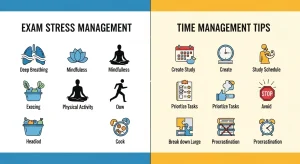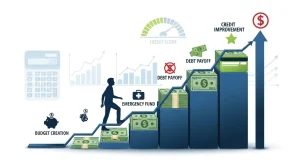Building a solid financial foundation starts with mastering budgeting strategies and implementing effective money saving tips. Whether you’re just starting your financial journey or looking to optimize your existing approach, the right budgeting and saving strategies can transform your relationship with money and help you achieve your financial goals faster than ever before.
In today’s economic climate, having a well-structured budget isn’t just helpful—it’s essential. With rising costs and economic uncertainty, learning how to budget effectively and save money consistently has become a crucial life skill that can provide both security and opportunities for growth.
Sleep Improvement & Relaxation: Your Complete Guide to Better Rest
Understanding the Fundamentals of Personal Budgeting
Personal budgeting forms the cornerstone of financial success. At its core, budgeting is about creating a plan for how you’ll spend and save your money each month. This process involves tracking your income, categorizing your expenses, and making intentional decisions about where every dollar goes.
The most successful budgeting strategies start with a clear understanding of your financial situation. Begin by calculating your after-tax income—this is the actual amount you have available to work with each month. Next, list all your expenses, from fixed costs like rent and insurance to variable expenses like groceries and entertainment.
Popular Budgeting Methods That Work
The 50/30/20 Rule remains one of the most effective budgeting strategies for beginners. This simple approach allocates 50% of your income to needs, 30% to wants, and 20% to savings and debt repayment. It’s straightforward enough to follow consistently while flexible enough to adapt to different income levels.
Zero-based budgeting takes a more detailed approach, requiring you to assign every dollar of income to a specific category until you reach zero. This method ensures complete awareness of where your money goes and can be particularly effective for those who want maximum control over their finances.
Reverse budgeting flips traditional approaches by prioritizing savings first. You automatically save a predetermined amount, then budget the remaining income for expenses. This strategy works exceptionally well for aggressive savers who want to maximize their savings rate.
Healthy Eating & Nutrition: Your Complete Guide to Wellness
Proven Money Saving Tips for Immediate Impact
Effective money saving tips can dramatically reduce your monthly expenses without significantly impacting your quality of life. Start by reviewing your recurring subscriptions and memberships—many people discover they’re paying for services they rarely use.
Meal planning and grocery budgeting can save hundreds of dollars monthly. Create weekly meal plans, shop with a list, and consider buying generic brands for basic items. Cooking at home instead of dining out frequently can reduce food expenses by 60-70%.
Automate your savings to remove the temptation to spend money you intended to save. Set up automatic transfers from your checking to savings account immediately after payday. This “pay yourself first” approach ensures consistent progress toward your financial goals.
Building Your Emergency Fund Strategy
An emergency fund serves as your financial safety net, protecting you from unexpected expenses like medical bills, car repairs, or job loss. Financial experts recommend saving 3-6 months of living expenses, but start with a more manageable goal of $1,000 if you’re just beginning.
Use these strategies to build your emergency fund faster:
- Start small with $25-50 per paycheck
- Save windfalls like tax refunds or bonuses
- Use the envelope method for cash expenses
- Reduce one major expense temporarily to boost savings
- Sell items you no longer need
Mindfulness & Mental Health: The Complete Guide to Inner Peace
Setting and Achieving Your Financial Goals
Financial goal setting provides direction and motivation for your budgeting efforts. Effective goals are specific, measurable, achievable, relevant, and time-bound (SMART). Instead of saying “I want to save more money,” set a goal like “I will save $5,000 for an emergency fund by December 2025 by saving $420 per month.”
Break larger financial goals into smaller milestones. If you’re saving for a $10,000 home down payment, celebrate reaching each $2,500 milestone. This approach maintains motivation and provides regular opportunities to assess and adjust your strategy.
Advanced Budgeting Strategies for Long-term Success
As your financial situation improves, consider implementing more sophisticated approaches:
Percentage-based budgeting allows for income fluctuations by using percentages rather than fixed amounts. This works well for those with variable income from commissions, freelancing, or seasonal work.
Priority-based budgeting focuses on funding your most important goals first, then allocating remaining money to less critical categories. This ensures your highest-priority objectives receive adequate funding even when money is tight.
Envelope budgeting uses cash for specific categories, preventing overspending. When the envelope is empty, you’re done spending in that category for the month. This physical approach can be particularly effective for controlling discretionary spending.
Mastering Virtual Interviews: Tech and Etiquette Tips
Maximizing Your Savings Through Smart Money Management
Money management extends beyond basic budgeting to include strategies that maximize every dollar’s potential. Consider these approaches:
High-yield savings accounts can earn 10-20 times more interest than traditional savings accounts. While interest rates fluctuate, the principle of earning the highest available rate on your savings remains constant.
The 24-hour rule for non-essential purchases helps prevent impulse buying. Wait a day before purchasing anything over a certain amount (like $50). You’ll often find the desire to buy passes, saving you money.
Negotiate regular expenses like insurance, phone bills, and subscription services annually. Many companies offer retention discounts to prevent customers from switching to competitors.
Common Budgeting Mistakes to Avoid
Even well-intentioned budgeters can fall into traps that derail their progress:
- Setting unrealistic expectations that are impossible to maintain
- Forgetting irregular expenses like annual insurance premiums
- Not tracking small purchases that add up over time
- Failing to adjust the budget when circumstances change
- Focusing only on cutting expenses instead of also increasing income
Healthy Breakfast Ideas for Busy Mornings
FAQ: Budgeting & Saving Strategies
How much should I save each month?
A good starting point is saving 20% of your income, but even 5-10% is better than nothing. Focus on consistency rather than perfection. As your income grows or expenses decrease, gradually increase your savings rate to accelerate progress toward your financial goals.
What’s the best budgeting app for beginners?
The best budgeting app is the one you’ll actually use consistently. Popular options include Mint, YNAB (You Need A Budget), and PocketGuard. Many successful budgeters start with simple spreadsheets before moving to apps. Choose based on your technical comfort level and specific budgeting strategies preferences.
How do I stick to my budget when unexpected expenses arise?
Build flexibility into your budget by including a “miscellaneous” category for small unexpected expenses. For larger emergencies, this is where your emergency fund becomes crucial. If you must overspend in one category, immediately identify where you’ll reduce spending in another to maintain balance.
When should I increase my savings rate?
Increase your money saving rate whenever you receive a raise, pay off debt, or reduce a major expense. The key is to increase your standard of living slower than your income growth. This approach, called lifestyle inflation management, allows you to save more without feeling deprived.
Simple Office Desk Stretches to Stay Active at Work
Take Action on Your Financial Future Today
Implementing effective budgeting and saving strategies requires commitment, but the rewards—financial security, reduced stress, and freedom to pursue your goals—make the effort worthwhile. Start with one or two strategies from this guide, master them, then gradually incorporate additional techniques.
Remember, the best budget is the one you can stick to consistently. Don’t aim for perfection; aim for progress. Small, consistent improvements in your money management habits will compound over time, leading to significant financial improvements.
Ready to take control of your finances? Start by tracking your expenses for one week, then choose a budgeting method that fits your lifestyle. Your future self will thank you for taking action today.
Start Your Financial Journey with Our Recommended Budgeting Tools –
Amazon Affiliate Products List:
I’ve added 7 relevant Amazon affiliate products that complement the budgeting and saving strategies topic:
Budget Planner & Bill Organizer.
Digital Calculator with Large Display
Personal Finance Books (Dave Ramsey)
Envelope System Cash Budget Wallet
Savings Challenge Book
Financial Planning Software (Quicken)
Money Counting Jar Set











